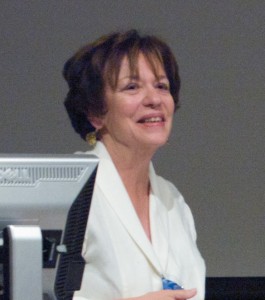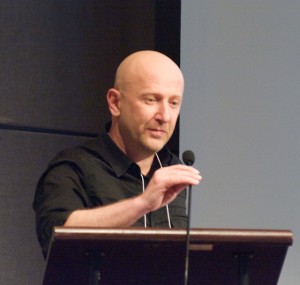July 9, 9:30AM – Fletcher Challenge Room 1900
Presenters
Barbara Cohen, Director of Humanitech, University of California, Irvine. Steering Group, The Open Humanities Press.
Gary Hall, Professor, Media and Performing Arts, Coventry University, UK. Co-founder of The Open Humanities Press.
Archived video stream of session
Background
Launched in May, 2008, The Open Humanities Press (OHP) is a scholar -led open access publishing initiative that currently publishes 10 journals. Central to OHP’s vision are goals articulated by the Budapest Open Access declaration (2002) to remove barriers to scholarly literature, accelerate research, enrich education and share the learning of the rich world with the poor.
Session Overview

Barbara Cohen started the session with what she called “Open Access 101”, a quick survey of some basic principles and recent initiatives focused on ideas of giving free and open access to peer-reviewed scholarly literature on the Internet. This background is important context to consider in relation to the principles and goals driving The Open Humanities Press (OHP), an open access publishing house that launched in 2008 with 7 journals (now 10). Central to OHP’s vision are goals articulated by the Budapest Open Access declaration (2002) to remove barriers to scholarly literature, accelerate research, enrich education and share the learning of the rich world with the poor. Cohen went on to note that despite the fact that most scholars prefer to read electronic copies of articles, the Internet is still perceived by many Humanties scholars as being an unsuitable publishing medium for serious humanities research. In a 2008 talk at Irvine, Sigi Jӧttkandt, one of the co-founders of the OHP, characterized this perception where the Internet was seen as “a sort of open free-for-all of publishing” medium in stark contrast to trusted, peer-reviewed paper-based scholarly journals. The OHP was envisioned as a means to overcome this perception by bringing high-quality editorial standards and design processes to the field of Humanities scholarly publishing on the Internet. It was essential for the founders of the OHP that scholars felt that its journals would be good places to publish. The founders of the OHP feel that their stragegy of developing an open access publishing house has been a good way to gain the trust of the scholarly community in the humanities.
Cohen described OHP’s key goals as: advocating Open Access in the Humanities; fostering a community of prestigious Humanities scholars; promoting intellectual diversity, and exploring new forms of scholarly collaboration. A strong peer review model was seen to be key to the success of the OHP in developing a level of creditability and trust amongst Humanist scholars, and to that end, the OHP has gathered a prestigious, rotating editorial board, as well as a strong steering group, all without any operating budget. The OHP also has worked to bring open access content to its readers in journals that share high production values and effective leveraging of new technologies such as PKP’s Open Journals System and, in the future PKP’s Open Manuscript Press software.
Gary Hall

The second speaker, Gary Hall, picked up the importance of open access initiatives with books and monographs. Such initiatives were particularly significant in the Humanities because scholars in these disciplines place such emphasis on books over journal articles. Hall discussed several book projects that are underway with The OHP, describing these efforts as focused upon a new cultural studies project, liquid books with a fluid structure up to the challenge of exploring the potential shape of the book to come. The first of these books has been published as New Cultural Studies: The Liquid Theory Reader. Hall was particularly interested in the potential of experimental projects that would allow scholars to challenge traditional concepts of the codex by expanding to include the range of materials/media found within printed books: excerpts, snippets of media, clips from multimodal texts. Such an exploration is an important response to the emerging landscape for digital texts, a landscape influenced by the proliferation of books scanned by Google and reading devices from ipods to Kindles.
Hall also indicated his interest in creative ways to employ open access and open editing strategies in liquid books that were free for anyone to read, write, remix, and reinvent to produce alternate parallel versions of books. Such acts of distributed writing and editing within liquid texts would, Hall hoped, raise critical challenges to traditional notions of authorship, intellectual property, authority, etc. This potential dismantling of the authority of the text was a particular challenge for open access initiatives, as they ran the risk of reinscribing and reproducing traditional approaches and limits of current knowledge production, this time in an electronic space. Drawing upon Derrida, Foucault and Barthes, Hall offered that open access could bring interrogations of academic authorship so as to loosen up these notions, making them less fixed and rigid (more jello-like). By recognizing some wobbles in the smooth surface of academic publishing, scholars would be in a good position to delineate and respond to shifts in power and authority increasingly evident in decentralized forms of writing such as MyTimes (a cross between the associated press and an RSS reader), Wikipedia (a networked, distributed and very liquid work), and other such fluid sites for knowledge production. Such a redistribution and decentring of traditional authority could help scholars to avoid replicating the current centre/periphery dynamics of knowledge production and dissemination, an imbalance that sees 90% of the world’s scientific research being published by just 15 countries.
Question Period
During the question period, one member of the audience identified a contradictory tension that seemed evident in the presentations offered in the session. On the one hand, the speakers stressed a need to establish the credibility of academic publishing. On the other hand, it was clear that there was also a keen interest in exploring the boundaries of new media (and traditional academic practice) so as to destabilize the model of academic publishing alongside the decentring of other concepts like authority (authorship), and the very form of scholarly writing be it journal articles or monographs. Keeping these things in balance is quite a challenge, especially when many scholars are as intent on building credibility in these new forms of academic scholarship at the same time as others are intent on destabilizing the very units and processes that have long characterized academic discourse. This somewhat anxious tension seems to describe aptly the stance of Humanist scholars exploring new cultural studies.
Related Links
The Open Humanities Press – Website for The Open Humanities Press, with links to their current journals: Cosmos and History, Culture Machine, Fast Capitalism, Fibreculture, Film-Philosophy, Image and Narrative, International Journal of Žižek Studies, Parrhesia, Postcolonial Text, Vectors.
Hall, G. (2008). Digitize This Book!: The Politics of New Media, or Why We Need Open Access Now (Minneapolis and London: University of Minnesota Press).
Jӧttkandt, S. (2008). Free Libre Scholarship: The Open Humanities Press. Irvine, 3 April, 2008.
Jӧttkandt, S. and Hall, G. (2007). Beyond Impact: OA in the Humanities. Brussels, 13 February, 2007.
King, J., Lynch, C, Willinsky, J. (2009) Open Access in the Humanities. Podcast. University of California, Irvine.
2 replies on “On Open Humanities Press: A Panel Presentation by Members of the OHP Steering Group: The Session Blog”
[…] session provided the library perspective as a follow up to the previous discussion on the Open Humanities Press (OHP) and its involvement with digital monographs, or “liquid books” (Hall). UCLA is working in […]
[…] Part 1 – On Open Humanities Press: A Panel Presentation by Members of the OHP Steering Group […]